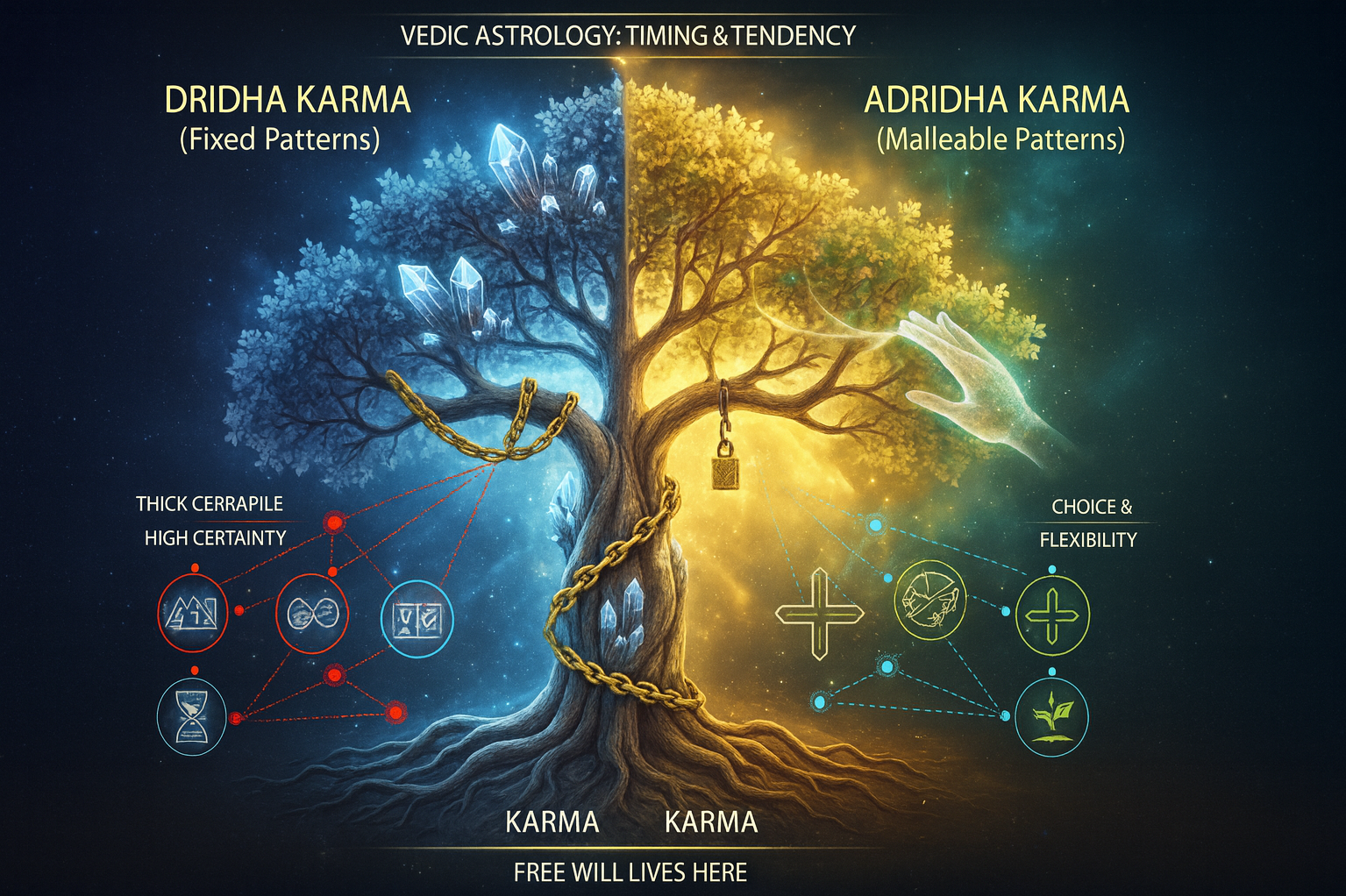A serious student eventually asks the real question: how far can Vedic astrology prediction actually go? Can it tell me when I’ll marry, when money comes in, when health dips, when a move will happen? The honest answer is nuanced. Vedic astrology prediction can time high-probability windows with surprising clarity, especially when birth data are accurate. But it does not force specific events. It shows cycles of opportunity, pressure, and change. You still choose how you move inside those cycles.
This boundary between timing and free will is where real Jyotish lives. Understanding it keeps you grounded, and it protects you from both fatalism and fantasy.
Timing, Potential, and Activation in Vedic Astrology Prediction
When the exact birth time and place are known, Vedic astrology prediction can identify periods that are ripe for visible life events. Career shifts, relocations, formal commitments, childbirth, surgeries, even sudden breaks in routine — these often align with planetary periods (dashas) and transits in a way that is not random.
For example, if a person enters a Venus–Jupiter period and both planets are linked to the 7th house of partnership, that window is excellent for engagement, marriage, or consciously defining commitment. Likewise, sudden Mars + Rahu activation in a vulnerable house can correspond with conflict, accident risk, or urgent decision pressure. This is how timing in Vedic astrology works in practice: certain combinations tend to express as certain classes of events.
But here is the key point: astrology does not drag you into action. It describes a field of possibility. If the chart shows an ideal seven-month window for a job change and you actively apply, negotiate, and follow leads, the change tends to land quickly. If you do nothing during that same period, the window passes. A later dasha may offer a similar opportunity, or it may not. Vedic astrology prediction tells you when the door is unlocked. Walking through it is on you.
Dridha vs. Adridha Karma: Where Free Will in Astrology Actually Lives
Classical Jyotish talks about dridha karma (fixed patterns) and adridha karma (malleable patterns). This is not superstition. It is a way of sorting what you can shape and what you mostly have to live through.
Dridha karma refers to themes that tend to manifest no matter what: deep responsibilities, certain structural family patterns, key health sensitivities, or unavoidable turning points. These are the strong signatures in the chart that keep repeating. When these activate, Vedic astrology prediction is often extremely reliable. The event, or at least the category of event, shows up.
Adridha karma is flexible. These are areas where awareness, discipline, and timing choices matter. Here, free will in astrology is very real. You can redirect career focus, repair a relationship, get ahead of a health pattern, or avoid escalation. The dasha may demand you work on that theme, but the tone and outcome are yours to co-author.
This is the actual middle ground. Astrology is neither “everything is fated” nor “nothing matters.” It reveals which parts of life are elastic and which parts are load-bearing.
Why Timing Is Often Clearer Than Form
One of the most practical truths: sometimes it is easier to tell when something will shift than to name the exact form it will take. That frustrates clients but it is technically honest.
It is usually easier to predict, “Late August shows pressure on work structure,” than to promise, “You will resign on the 23rd and become Creative Director at X Company.” Why? Because the timing comes from the activated planet. The form is filtered by real-world context: education, industry, geography, economics, culture, and personal choice.
Similarly, a strong Mars + Rahu trigger can indicate a risk window for injury or confrontation. That is often easier to see than, “You will sprain your wrist lifting luggage.”
In other words, Vedic astrology prediction is strongest at forecasting pressure windows, opportunity windows, and change windows. The exact outer costume of that change can vary.
Free Will in Astrology: How Choice Interacts With Karma
A clean way to think about Jyotish is this: it forecasts weather, not your behavior in the weather. You cannot negotiate away a storm front. But you can decide whether to postpone travel, carry an umbrella, or go surfing and love it.
In Jyotish language:
- The dasha tells you which planet’s storyline is dominant right now. That is the stage.
- Transits tell you where that storyline will show up in physical life. That is the scene.
- You choose how to respond. That is the performance.
For example, a Mercury dasha will amplify themes of thinking, messaging, negotiation, learning, analytics, contracts. How you use that period is your responsibility. You can spiral into anxiety and overthinking (low Mercury) or sharpen skill, communicate clearly, publish, study, and build intellectual capital (high Mercury). The same cycle can create very different outcomes depending on consciousness. This is where free will in astrology truly matters.
Why Wealth, Happiness, and Success Are Harder Questions
People love to ask, “Will I be rich?” or “Will I be happy?” These are trick questions. Astrology can read prosperity cycles, stability potential, and emotional baselines. It can absolutely show when material gains are easier, and when emotional steadiness is supported. But “rich” and “happy” are personal definitions.
Two natives can enter almost identical Venus–Jupiter cycles. One feels blessed because debts are paid and life is finally calm. The other feels behind because they did not hit eight-figure startup money in a year. Same planetary support, totally different narrative. Vedic astrology prediction can time prosperity. It cannot decide your standard for “enough.”
So when we handle questions about wealth or happiness, we talk in terms of capacity, timing, and probability — not guarantees.
Why Career Is So Tricky to Name
Here is a boundary that students almost never hear early enough: identifying when career will shake is often easier than naming your exact profession. The chart shows how you are wired to operate, not always what job title you will carry.
Examples:
- A strong Mercury gives systems thinking, data fluency, messaging, analysis. That can become finance, copywriting, consulting, product strategy, software, journalism, law, analytics, community building, and more.
- A strong Mars gives immediacy, risk tolerance, physical drive, confrontation with reality. That can become surgery, emergency response, entrepreneurship, engineering, activism, the military, elite sport.
- A strong Venus gives refinement, aesthetic intelligence, attraction, mediation. That can become design, wealth management, diplomacy, luxury brand work, client relationship leadership.
The astrology can show “your system runs like this” with great clarity. It cannot always tell you whether you will aim that system at neurosurgery or high-stakes litigation. Real-world opportunity decides that. Again: Vedic astrology prediction maps your function, not just your job title.
How to Use Vedic Astrology Prediction as a Tool (Not as a Crutch)
The most valuable use of Jyotish is not to escape responsibility. It is to cooperate with timing. When you know which cycles are expansion cycles and which are pressure cycles, you stop fighting the wrong battles at the wrong time.
Astrology, used properly, tells you things like:
- “Now is expansion. Build, launch, ask, propose.”
- “Now is consolidation. Pay debt, stabilize, protect reputation.”
- “Now is partnership. Commit and formalize.”
- “Now is endurance. Do the work quietly and do not expect applause yet.”
- “Now is inner work. The outer win will lag but don’t panic about that.”
This rhythm-awareness is the real gift. You stop forcing outcomes in hostile timing and you stop underselling yourself in friendly timing. In that sense, good astrology is practical self-regulation.
Important Notes
How accurate can astrology truly be?
When birth time is exact and the astrologer synthesizes dashas, transits, dignity, and divisional charts, the timing windows can be impressively sharp. Still, every window is just that — a window. You have to step through it. Vedic astrology prediction gives probability and timing, not guaranteed delivery.
Why are some events easy to predict while others stay vague?
Clear signatures — like harsh Mars/Rahu activation or Saturn crushing the 10th house — often coincide with disruption, confrontation, job overhaul, or health strain. But “exact profession” is built from talent plus education plus economics plus culture. Astrology shows style and timing. Life circumstances choose the costume.
Can free will override astrological indications?
Free will acts inside karma, not outside it. A tough Saturn period will still demand accountability and structure. You cannot skip the lesson, but you can choose whether it becomes burnout and bitterness or discipline and authority. The planet sets the class. You decide how you study.
Why are questions like “Will I be happy?” so hard to answer?
Happiness, wealth, and success are subjective. Astrology can show emotional stability potential, prosperity cycles, and internal restlessness vs peace. It cannot define what you will call “enough.” That is personal psychology, not planetary math.
What defines the real boundary of astrology?
The real boundary is this: Jyotish can map timing, pressure, opportunity, temperament, and likely themes. It cannot ethically promise fixed, unavoidable outcomes. The smartest way to use Vedic astrology prediction is as timing intelligence, not as surrender of agency.
FAQ
Why does astrology emphasize timing over certainty?
Because timing is where Jyotish is strongest. Dashas reveal which planet’s storyline is active. Transits show where that storyline lands in real life. When “your” planet is on stage, things move. When it is offstage, progress is harder to force. Respecting timing means you act when the universe is already leaning in your favor.
Can astrology help me change my fate?
It helps you change the expression of fate. Knowing in advance that a pressure cycle is coming lets you prepare, behave with restraint, ask for help early, and avoid destructive impulses. Awareness is often the most effective remedy. This is where dridha karma vs free will becomes real in lived life.
Why do predictions sometimes fail?
Common reasons include inexact birth time (which can shift house lords and divisional charts), overemphasis on one factor instead of full synthesis, overlapping influences that blur one storyline, or intentional human choice that steers the situation differently. Any honest astrologer will admit this up front.
How should I actually use astrological guidance?
Treat astrology like a strategic calendar. Use it to plan launches, relocations, negotiations, healing work, and rest. Use it to know when patience is wisdom and when boldness is rewarded. Do not use it to avoid responsibility. Use it to act with timing.
Keep Studying with Much Needed Astro
If you take one thing from this: Vedic astrology prediction is not here to trap you in fate. It is here to help you work with time consciously. You get better outcomes when you act in alignment with cycles instead of fighting them blindly.
Much Needed Astro exists for exactly that. We teach Jyotish the way it was meant to be used — as timing intelligence, self-awareness, and practical guidance, not fear-mongering. If you’re serious about studying real Jyotish, stay with Much Needed Astro — no fluff, no doom talk, just clarity you can actually apply.




